- Home
- Taylor Caldwell
The Final Hour Page 4
The Final Hour Read online
Page 4
The baron looked at the heap of crumbs on the cloth, and impelled by his absorption, the others gazed at it also. No one could have explained what so compelled their attention. But the crumpled and abandoned mound seemed of enormous and terrible significance to them. They felt a pressure in the atmosphere, a constriction in their chests, even Ramsdall, even von Bernstrom.
‘I had an old nurse, when I was a child,’ said the baron, in a soft voice. ‘I wasted bread; I was a very wilful child. I piled up crumbs—like this. It was a favourite occupation of mine. She said to me, once: “When you waste bread, holy bread, in this fashion, your soul will never rest after it leaves your body. It will go roaming about the world, until every last crumb is gathered up, out of the earth, out of the bellies of birds and animals, out of the water. You will look long and far. For you have done a great sin.”’
He lifted his head, and for the last time he looked slowly at each face.
‘“Long and far.” The world will soon be full of souls, searching. We have done a great sin.’
The count lit a cigarette, with his graceful if wooden gesture. He blew a plume of smoke into the brighter air, and watched it curl. His thoughts were virulent, and full of contempt. But he kept his harsh face impassive and aloof. When he returned his attention to the others, after a long moment or two, the baron was watching him, his nutbrown eyes intent, significant, filled with melancholy and deep thoughtfulness. For some strange reason, the count was immediately imbued with impotent rage and hatred.
Ramsdall stirred his fat bulk uneasily on the chair. ‘Well, in speaking for myself, I am glad to say that I am returning to England. There are currents here, in France. I confess I don’t like them. I don’t like the implication of doom here lately. The air in England is more wholesome, even if it rains almost constantly.’ He laughed with affection.
He turned to Peter. ‘You will be glad to hear that I intend to continue my policy of peace, in my newspaper. I have always supported Chamberlain, of whom you don’t approve, my dear lad. Nevertheless, I believe the old codger is right. We’ve nothing to gain by war, even if there was the remotest chance of such a catastrophe, which there is not Your articles in my paper, Peter, were much approved by thoughtful people. May we hope for others like them?’
‘No,’ said Peter quietly.
Ramsdall raised his eyebrows at this impoliteness. He assumed a whimsical expression, and sighed, leaning over to deposit the ash of his excellent cigar in the silver tray.
The count said: ‘If I thought there was to be war, my dear Mr Bouchard, I should leave France immediately. I have my friends in Germany who keep me informed. You observe that I am quite comfortable in France. I do not leave. I remain. Does that mean nothing of significance to you?’
‘Yes,’ said Peter.
The eyes of the two men met, and held.
In the ringing silence which followed Peter’s reply, Celeste rose, and the gentlemen with her, all except Peter, who was kept in his chair by the light pressure of his wife’s hand on his shoulder.
‘You must please excuse Mama and me,’ said Celeste, in her sweet low voice. ‘We have still some packing to do.’
She extended her hand to Lord Ramsdall, who took it warmly. Her face wore its worn look of delicate sternness, but her eyes were direct between their curved black lashes. ‘It is good-bye, then, Lord Ramsdall.’
‘No, rather au revoir, dear Mrs Bouchard,’ he said, gallantly. ‘I expect to be in America in October. I trust I shall see you then?’
She smiled briefly, then turned to the count, who raised her hand to his lips. Now her sternness became fixed and hard.
Her mother, Adelaide, received the gentlemen’s regretful remarks in polite silence. The ladies left the terrace. Their departure was soon followed by that of Lord Ramsdall and Count von Bernstrom. The baron remained.
He and Peter sat for a long time on the sunlit terrace, not speaking, but looking out over the gulf where the sea sighed restlessly.
‘It will be an unhappy day for France, if or when von Bernstrom becomes the gauleiter,’ said the baron, wearily.
Peter moved in his chair, and clasped his hands together.
‘You are sure, Israel? That is the plan? It is incredible!’
The baron shrugged. ‘“I have my friends in Germany who keep me informed,”’ he quoted, with his sad and quizzical smile.
‘But France! The Maginot Line!’
‘I have told you so often, dear Peter, that a thousand Maginot Lines cannot resist the wickedness in men’s hearts.’
‘Israel, I must ask you again: Why don’t you inform Daladier, Bonnet, Reynaud, all of them? The authorities? That this scoundrel is a spy, a dangerous plotter?’
Again the baron shrugged, and spread out his hands. ‘I have told you: they already know. They are helpless, or are in the plot. What is one to do?’
Peter groaned under his breath. ‘I tell you, I can’t believe it! You must be mistaken! This is fantastic. It is a nightmare.’
‘It is a Walpurgis Night,’ agreed the baron. ‘The world is entering on the long night.’ He added: ‘The dance of madmen. The carnival of the clowns. The merriment of the murderers. Listen: you can hear the wailing of the insane flutes, the beat of the terrible drums. The stage is set. The world is the audience. The world has paid the actors, and called them on the stage. It has paid its price to see them, in greed and hatred and treachery. It will leave the theatre knee-deep in blood. Its own blood.’
He continued, in so low a tone that Peter hardly heard him: ‘Not Hitler. Not Mussolini. No. These are not the guilty. It is all the world. Not only Germany. No. England, France, America. This is the play they have demanded. These are the actors they have evoked. And may God have mercy on our souls.’
His old enormous sickness seized Peter again, a sickness of the soul, an anguish and impotence of the mind.
‘There was Manchuria,’ said the baron. ‘And God said to the world: “Now? You will oppose the evil ones now?” But the greedy ones replied: “No. We shall make money by this conquest.” God is patient. There was Ethiopia: “Now?” said God. But no, it was not now. There was the same answer of the greedy, and the stupid whimpered and cried: “Am I my brother’s keeper?” And then there was Spain. “O!” cried God. “Surely now? Look at the blood of the innocent, the righteous, the just, the lovers of freedom, the poor and honest men!” But the wicked sneered, the greedy reached forth their hands, the treacherous turned away. And the stupid, as always, shivered and hid their faces. Then came Czecho-Slovakia, Austria. Out of their depths, out of Germany, came the appeal of good men, innocent men, helpless men. “World,” said God, sternly, “it is now? Surely it is now?” But there was only silence, or laughter, or cries of hatred.’
He paused. Now his voice was solemn, low, very cold. ‘There will come another day. Very soon. And God’s voice will fill the universe like a cosmic and awful thunder, saying: “Men, ye shall surely die, for ye have ignored the cries of your tortured brother. The punishment is upon you. This is the final hour. To every people there comes one terrible and inevitable final hour, when it must choose between those things by which men live, or those by which they die. The hour is upon you. It is Now. Shall it be now, O faithless and adulterous generation?”’
Peter listened with passionate attention. He said: ‘Will it be “now,” Israel!’
The baron lifted his head and looked at the sky. He clasped his hands as if in urgent prayer, humble and profound.
‘I believe,’ he whispered, ‘surely I believe: it will be Now.’
CHAPTER IV
Celeste and her mother occupied seats of honour at the table of the captain of the Iie de France. The captain was a sour Breton, who disliked the sea, and particularly disliked wealthy passengers. He came of a long line of fishermen, who regarded the sea as a vast brute whose existence could be tolerated only because it separated the coast of France from England, and contained fish. He had no romantic illusions about the great w
aters; he had seen too many men, including his own father, die in them. Safety and food: these the sea provided. Thus it had a reason for being. But he could not believe that one of its reasons was to furnish luxurious transportation between continents for the idle and the rich and the vicious. One used the sea as a bulwark, as a necessity. To use it for recreation, to ride on the top of its watery chasms and profound horrors was to him something frightful. He brooded on this constantly. He would stand on the bridge at night and regard the seething blackness with hatred, unmoved by the shattered silver path of the moon, or the phosphorescence that sparkled in the wake of the ship. In his hatred was fear. But the fools sleeping, drinking, dancing, fornicating and lying and eating below knew nothing of fear, except the dread that the coming years might not be so well for them.
The captain would clench his fists, and smile grimly. The coming years! He had once been first officer on a French warship. He flexed his arm. He was not old! He could still fight. With his inner ear, he heard the echoing hollow boom of guns riding the waves like the bellowing of giants. Ah, how he would fight! The sea had another use besides safety and food. It could bear the prows of iron ships into the guts of the enemy. He saw banners against the sky. The Boche! How he hated the Boche! Almost as much as he hated the sea. The Boche seemed to him more of a horror than the waters, for the Boche had a mind and did his evil deliberately. The captain, his heart beating more strongly than it had beaten in years, felt temporarily superior to the sea. He leaned over the bridge and spat into it. ‘You are very foul,’ he addressed it. ‘You do not sink the ships of the Boche immediately when he embarks on you. If you did that, I could endure you. I could forgive you.’
He wondered how long it would be before the Boche would rise to his feet again, ankle-deep in blood, and set out on his ancient path to war. He, the captain, had in his safe a certain sealed envelope, which was not to be opened except in the event of sudden war. What did that envelope contain? What orders? The dark lined face of the captain tightened. Would he be ordered to remain in a neutral port with his ship? That would be bad. Now he felt ill. Or, would he be ordered to surrender that ship with all hands on board to the Boche? He thought this, incredulously. He recalled that during the last war he had never thought such a thing. To think it would have been dishonour, deserving of death. But in these malignant days all things were possible. It was no dishonour, to think them. That seemed very terrible to the captain. He contemplated the hidden enemies of France, lurking like foul slugs under stones, like poisonous vipers hidden in little caves, under ferns, in wet sunless places. Always they lived, these enemies, but in the past they had not dared come forth lest a strong heel crush them. Now, they waited. The strong heels were no more, or were tied. There were the clergy, the haters of liberalism, enlightenment and freedom, always waiting, with their interdictions, their narrow venomous faces, their crosses, their chants, their chains, their cruelty, and their hatred. There were the pusillanimous statesmen, the plotters, the servers of raucous and venal women, the cowards, the whimperers, the creatures without fortitude or honour, the diseased, the liars and the traitors, the rich fools who remembered nothing and hated always.
What had France become! He thought of his countrymen, whom he brought for idle pleasure to America, and then returned them to France a little later. There was not even a robust zest in their dirty women. They were rotten with disease; they had no gay light in their vicious eyes. He thought of the fat and swarthy industrialists, the politicians, the perfume purveyors, the diplomats, the dressmakers, the male milliners, the writers of obscene and elegant literature, the Jesuitical and attenuated gentlemen, impotent and milky. Were they France? No, said his heart, with sudden passion. There were still the Breton fisherfolk, the peasant in his field, the little artisan, the man in the factory and the miners. He knew them, did the captain. France was dead and stinking at the top. But the trunk was sound. Then he felt ill again. A tree always died first at the top. Who, in this extremity, would cut away the dead wood with a ruthless hand, so that new branches could grow? Who would save the tree before decay engulfed even its roots? There was a prelate of the Church on board, with a thin and sinister face. He, too, sat at the captain’s table. The captain belched, and put his hand to his belly. No, he did not need bismuth. He only needed to drown the prelate. Then he could digest adequately again.
On this journey he had an unusually large percentage of Americans on board. Ah, the rats had heard the quaking of the timbers of Europe! They had smelt the distant fire. They had heard the rumble of iron feet. They had sniffed the effluvia of poison gas. So, they were returning to their vast fat homeland, where they could hide behind their banks and the barricades of their bonds. They thought they were safe. They were too stupid to know that no man was safe anywhere in the world, this time. The trumpets of doom were sounding below every wall in the world. The mortar was already sifting from between the stones and filling the air with choking dust. The great stones were already groaning as they shifted uneasily one upon another. The gates were rocking and squealing. Could these fools, these rich vagabonds, these useless imbeciles, these rotten posturers, hear and feel all this? He doubted it. No, they remembered nothing, they learned nothing, they thought nothing. They thought of nothing but their flesh, their bellies, their lusts, men and women alike.
Perhaps the coming ruin would be a good thing. Perhaps it would destroy these ravenous feeders, as collapsing walls destroyed the termites that devoured them. The gilt and plaster walls of cathedrals would fall, burying the fetidness within them; the thrones of kings, the lie-impregnated roofs of government: these too were trembling in the coming earthquake. And when the smoke drifted away from broken cities, would it be found that the fire had cleansed them of liars, exploiters, murderers, plotters and fools?
The captain really hated Americans. So fatuously did they believe that they were apart from the common world, that they lived on some esoteric plane that could be in communication with the plane of other men, but could not be invaded by them! When they said: ‘I am an American,’ they smiled smugly as if they had declared that they were inhabitants of Mars or the moon, and had nothing in common with Europe or Asia, that they breathed another air, were pressed upon by another atmosphere, had their being in another kind of flesh and another universe, whirling placidly above the world like an impregnable nebula. Who had told them this? What liars, what plotters, what traitors, in their own government, among their own people, had imparted this lie to them to their own coming death? There was only one world; there was only one race of men. If the Americans did not learn this soon, they must surely die. He thought of the prattling silly American women on board the ship, the vicious jewelled women with their high sharp laughter, their equally brainless and complacent men, and he muttered an imprecation.
Then he paused. He remembered the two American ladies at his table, the Mesdames Bouchard. But these ladies were very strange; they were not like their fellow Americans. They were quiet, well-bred, soft-voiced, almost always silent and restrained. The younger lady reminded him of his own daughter, who had been reared in a convent. Madame Bouchard had the same softness and delicacy and shyness, and the same aristocratic pride. Ah, and what a face, so stern and fragile, so clear of contour, so beautiful! There was her mother, also, a great lady. He felt kinder and easier in his mind. He had not met many such American ladies, but perhaps they were not the only ones. Then, too, there was poor Monsieur Bouchard, with the face of death, the firm clear voice, the penetrating light-blue eyes, the integrity and honour. Not a typical American. The captain shuddered as he thought of the typical male American, who was either obese or athletic, a gambler or a lover of horses and women, noisy, dogmatic, ignorant, egotistic, arrogant, believing that all things were for sale. (But, were they not? reflected the captain with acid irony.) Monsieur Bouchard was not one with his fellow Americans. It was said that he had come only twice to table during the past four days of the voyage. He was ill. But he had no nurse, no cou
rt physician, though his family was one of the richest in the world. Nor had he engaged the most expensive suite. (That was now occupied by an American female whose sole claim to fame was her notorious adulteries, from which she had extracted truly impressive sums. And all this during her career as soubrette, swimmer, naked dancer with fans, and mouther in the cinema! Truly a fantastic country, this America!) No, the suite occupied by the Bouchards was modest: three bedrooms, a common little sitting-room, and one bath. It was rumoured that young Mrs Bouchard was her husband’s nurse, and that she served him with endless devotion. That was probably the reason for the fixed and worn look about her eyes and mouth, the certain grimness in the bluish shadow about her delicate nostrils. The captain sighed. These were not the usual expatriates. He understood Monsieur Bouchard had lived in France for reasons of health. If so, he had not improved. Death was breathing his icy breath upon his neck. But one could understand that such a gentleman was returning to America not out of fear. It was something else.
Young Mrs Bouchard had not attended a single dance or party during the voyage. It was not to be expected that she would attend the last dance, which was to be held tonight. Tomorrow, they would reach New York.
So young a woman, so beautiful, and there was no light in her, no life, no young gaiety or joy. Only that dainty grimness of one delicated to duty. How very pathétique!
Celeste tapped gently on Peter’s bedroom door, and at his invitation to enter, she put her face archly into the room, and then went in, smiling brightly. Peter was in bed, his medicine on the lighted bed-table at his right hand. He was sitting high on his pillows, for he could no longer lie flat. Sometimes, during the night, the long and lonely night, Celeste could hear his coughing until she could no longer bear it, but must put her hands over her ears and sob soundlessly.

 Testimony of Two Men
Testimony of Two Men Wicked Angel
Wicked Angel The Arm and the Darkness
The Arm and the Darkness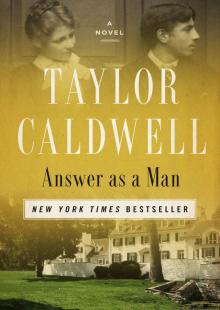 Answer as a Man
Answer as a Man Grandmother and the Priests
Grandmother and the Priests On Growing Up Tough: An Irreverent Memoir
On Growing Up Tough: An Irreverent Memoir Ceremony of the Innocent
Ceremony of the Innocent The Listener
The Listener Bright Flows the River
Bright Flows the River The Earth Is the Lord's
The Earth Is the Lord's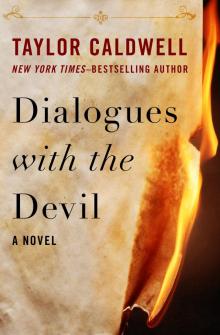 Dialogues With the Devil
Dialogues With the Devil A Tender Victory
A Tender Victory This Side of Innocence
This Side of Innocence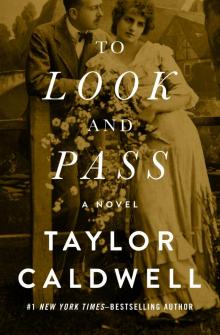 To Look and Pass
To Look and Pass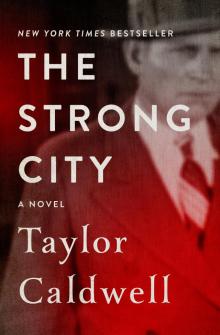 The Strong City
The Strong City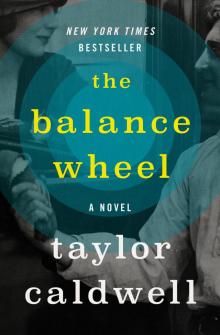 Balance Wheel
Balance Wheel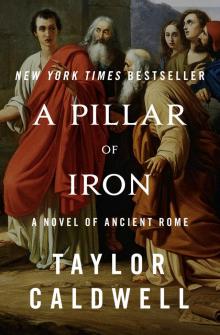 A Pillar of Iron: A Novel of Ancient Rome
A Pillar of Iron: A Novel of Ancient Rome Glory and the Lightning
Glory and the Lightning Dear and Glorious Physician
Dear and Glorious Physician The Wide House
The Wide House The Final Hour
The Final Hour Never Victorious, Never Defeated
Never Victorious, Never Defeated Unto All Men
Unto All Men The Turnbulls
The Turnbulls Your Sins and Mine: The Terrifying Fable of a World Without Faith
Your Sins and Mine: The Terrifying Fable of a World Without Faith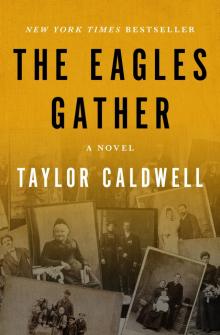 The Eagles Gather
The Eagles Gather Let Love Come Last
Let Love Come Last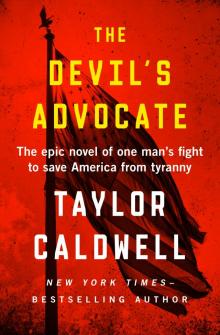 The Devil's Advocate: The Epic Novel of One Man's Fight to Save America From Tyranny
The Devil's Advocate: The Epic Novel of One Man's Fight to Save America From Tyranny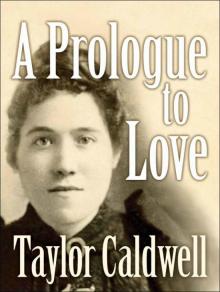 A Prologue to Love
A Prologue to Love Maggie: Her Marriage
Maggie: Her Marriage The Late Clara Beame
The Late Clara Beame Melissa
Melissa Great Lion of God
Great Lion of God Captains and the Kings
Captains and the Kings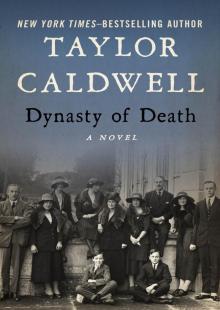 Dynasty of Death
Dynasty of Death No One Hears but Him
No One Hears but Him The Sound of Thunder
The Sound of Thunder There Was a Time
There Was a Time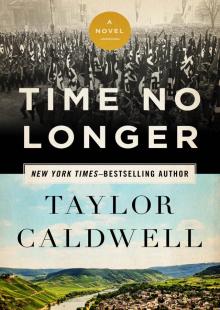 Time No Longer
Time No Longer I, Judas
I, Judas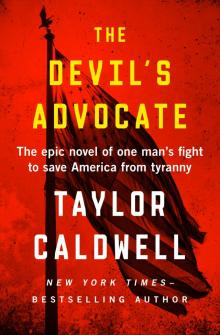 The Devil's Advocate
The Devil's Advocate The Romance of Atlantis
The Romance of Atlantis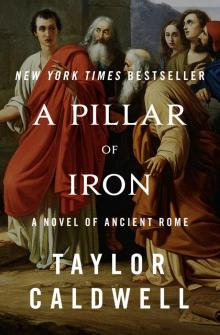 A Pillar of Iron
A Pillar of Iron On Growing Up Tough
On Growing Up Tough Your Sins and Mine
Your Sins and Mine